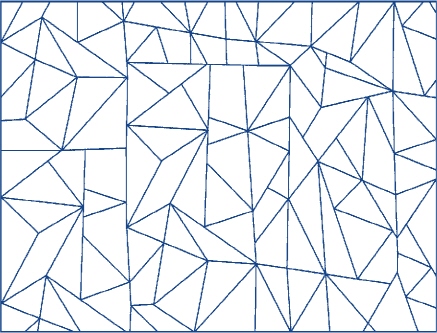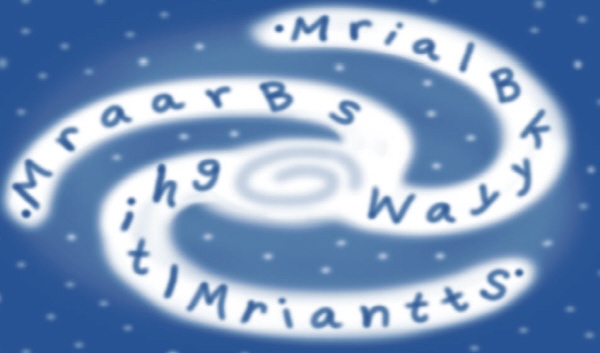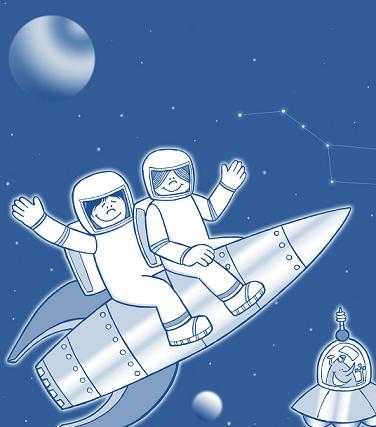Everything Kids' Astronomy Book (3 page)

After someone told you that the world was spinning, didn't it make you wonder why you weren't dizzy or why you didn't fly out into space when you jumped up in the air? Have you ever ridden on the flying swings at an amusement park? Before the ride starts, the swings hang down, but as soon the machine starts spinning, the swings move upward. The rider feels as though she is flying off into space; scientists call this centrifugal force. As the ride stops, gravity pulls the swings back down to the ground. How many other rides can you name that use centrifugal force and gravity to make you feel like you're in another world?
Try This
Going for a Spin
Ask an adult to tie a knot in a string and then thread it though a tennis ball. In an open area, hold on to the string and start spinning around; because of centrifugal force, the ball seems to pull more, the faster that you spin. When you get dizzy and stop, gravity will make the ball fall to the ground and probably you will, too.
Balancing Act
Newton believed that gravity was also what held the moon close to the earth and the earth close to the sun. Like the swing on the ride, the moon is slowly moving out and away from our planet. The earth's rotation is gradually slowing, its gravitational pull is less, and the moon's spinning motion is moving it further out from the earth. Over time this has made our days longer. Scientists believe that, long ago, a day lasted several hours less than it does now. Gravity affects everything we do each day. Turning a corner too fast on your bicycle and landing on the ground afterwards is just one example of centrifugal force and gravity at work. Can you think of others?
A Real Balancing Act
Can you balance a ball on the palm of your hand? How about spinning it on the tip of your finger? It might be easier if you try twirling a coin on a tabletop. Balance is very important to all things in the world and in space. There needs to be just enough rain and sunshine for crops to grow, and there must also be a balance between the day and night. The universe seems to be based on a balance between push and pull. If gravity was too strong here on Earth, you could barely lift your feet to walk, which would be like walking through water. If we didn't have enough gravity, you might have to wear weights to keep you on the ground. Ask your family if you can wear a pair of their big boots or heavy shoes around for a few minutes to see how it would feel to have more weight pulling down on you. Having balance, especially balance in our gravity, is a wonderful thing.
WORDS to KNOW
GRAVITY:
Gravity is the force that pulls things toward the earth. There is also a gravitational force in many other areas throughout the universe that seems to hold things together.

One in a Billion
With billions of stars in the sky, it's not easy to find one star in particular! Can you find the five-pointed star that is hiding in this corner of the galaxy?
Try This
Taking the Long Way Around
Many galaxies are elliptical, shaped more like a racetrack than a circle. If you want to see if the stars on the inside edge of a galaxy would go around faster than the stars on the outside edge, challenge one of your friends at a nearby racetrack! Go around once and see if the one on the inside track wins. Then trade places to see if the one on the inside track still wins.
You'll Get a “Bang” Out of This
Have you ever placed a drop of water on one of those capsules with a foam sponge inside? Almost immediately, a foam animal appears. Now imagine that the capsule is smaller than a grain of sand and the foam is really made of super hot material that grows thousands, maybe millions or billions of times larger within seconds. Many scientists are uncertain if the creation of the universe was a quiet event like the growth of the sponge or if there was a “Big Bang” like fireworks, only louder, when it happened. Some believe that they know
when
the Big Bang happened because they have learned how to measure the age of the galaxies and the radiation created by the event that still lingers all around the edge of the universe. Just imagine if we were having a cake for the universe's birthday party, we would need around 15 billion candles!
Can you name the visible colors in a rainbow? Each color has a frequency wave, just like the numbers on your radio. Many astronomers use special instruments on their telescopes to determine which one of these colors or frequencies a star or a galaxy sends out. A redshift or low-frequency wave indicates that they are speeding away from the Milky Way Galaxy. If the red-shift amount increases as you observe another galaxy (this means the other galaxy is moving even faster). If you were in another galaxy, it would seem as though our galaxy was speeding away from it. Does this make you wonder where the center of the universe really is? If you want to see an example of this, type in the words “Hubble & center of universe” in your search box on the Internet and see what you think!

Light Years Away
A farmer might think that a light year means that an ear of corn is smaller than last year, and a weatherman might use the words to tell you there wasn't a lot of rain in the last 365 days. Can you think of other meanings for the word “light”? An astronomer would be describing how many miles light would travel in a vacuum over the length of a year, which is over 5,000,000,000,000 miles! The spacecraft, Voyagers 1 and 2, after making a journey lasting for almost 30 years are just reaching the edge of the system that holds the sun and its planets. Light traveling at 186,000 miles per second would only take minutes to cover the same distance. If you would decide to become an astronomer right now, you might still be able to receive information from these ships for about fifteen more years! Even after we lose contact with these spacecraft, they could travel for many more years.
Sweet Scientists
Start at a letter marked with a dot. Collect every other letter as you spiral into the galaxy. When you get to the center, go back the way you came, collecting the unused letters until you reach the dot again. Write the letters, in order, in the spaces provided. When you are finished, you'll have three silly answers to the riddle!


Do you like puzzles? If you do become an astronomer, maybe you will be able to find the answers to some of the questions about the universe. Even the most intelligent scientists admit that they don't know the exact size, shape, or age of the universe. They are still guessing about how it began or if the galaxies will continue to move away from the center of the universe. Do you think that eventually Newton's gravity will start pulling everything back into that small space where it all began?
Which One?
What goes up must come
downâthat is my law.
Without me you would
float through the air like a
feather.
Which one am I?
A. Centrifugal force
B. Friction
C. Gravity
D. The wind

Just for Fun
It's in the Bag
Have you ever popped a balloon when it is full of air? Most astronomers think the big bang may have happened in a similar way. To see the force of the big bang at work, blow up a small brown paper bag and punch it until it pops. You might even have a contest to see who can pop their bag first.
Going Out with a Bang
If you have ever mixed baking soda with vinegar, you have seen how something fairly small can instantly become fairly large. It is thought that when the universe was born it started out small like a grain of sand but grew very quickly into the almost endless skies we gaze at today. The universe is constantly moving and spreading to places unknown. What could cause such a large explosion? Scientists have different theories of how the universe was formed, but most of them feel the big bang makes the most sense and explains all the things we are still seeing billions of years later.
Demo version limitation
Demo version limitation
Demo version limitation
Demo version limitation
Demo version limitation
Chapter 7
Space Oddities

